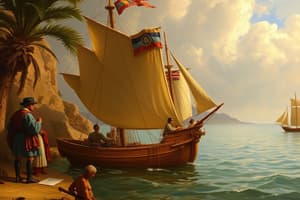Podcast
Questions and Answers
What was the main goal of the European Coal and Steel Community (ECSC)?
What was the main goal of the European Coal and Steel Community (ECSC)?
- To encourage competition and cross-border trade in coal and steel (correct)
- To establish close cooperation between France and Germany
- To supervise both French and German coal and steel production
- To minimize the risk of a threat to French security from Germany
Who proposed the idea of a common 'High Authority' to supervise coal and steel production?
Who proposed the idea of a common 'High Authority' to supervise coal and steel production?
- The Allies
- The German government
- Robert Schuman (correct)
- Jean Monnet
Which countries were involved in the establishment of the ECSC?
Which countries were involved in the establishment of the ECSC?
- France, Germany, Belgium, Luxembourg, the Netherlands, and Italy (correct)
- France, Germany, and Italy
- France and Belgium
- France and the United Kingdom
What was the role of the High Authority in the ECSC?
What was the role of the High Authority in the ECSC?
What was the purpose of the Court of Justice of the ECSC?
What was the purpose of the Court of Justice of the ECSC?
What was the role of the Assembly in the ECSC?
What was the role of the Assembly in the ECSC?
What was the ultimate goal of the ECSC according to Jean Monnet?
What was the ultimate goal of the ECSC according to Jean Monnet?
Study Notes
The Birth of the European Union: The European Coal and Steel Community
- The Treaty of Paris in 1951 established the European Coal and Steel Community (ECSC), the first step towards the European Union.
- The Treaty of Paris reconciled French and American/British objectives to allow economic development in West Germany while minimizing the risk of a threat to French security from Germany.
- The supervision instituted after the war by the Allies over coal and steel production in Germany was to be maintained for as long as possible.
- The French foreign minister, Robert Schuman, proposed a common “High Authority” to supervise both French and German coal and steel production, inviting other European countries to join the initiative.
- The ECSC aimed to establish close cooperation on a foot of equality between France and Germany while allaying French fears of a revival of German militarism.
- The ECSC's aims were overwhelmingly political rather than economic, but its central aim was to encourage competition and cross-border trade in coal and steel for more efficient production and cheaper prices.
- The ECSC was established by France, Germany, Belgium, Luxembourg, the Netherlands, and Italy.
- The High Authority was the most powerful institution in the ECSC, with members appointed by the Member States but independent of them.
- The Court of Justice of the ECSC was created as a dedicated jurisdiction.
- The Assembly made up of representatives of national parliaments and the Council of Ministers made up of representatives of national governments had less power and more of a consultative role.
- The ECSC was a departure from the standard model for international organizations, which were primarily intergovernmental.
- The ECSC was not conceived as an end in itself but as a first step towards comprehensive European integration, according to its intellectual father, Jean Monnet.
Studying That Suits You
Use AI to generate personalized quizzes and flashcards to suit your learning preferences.
Description
Test your knowledge on the birth of the European Union and the establishment of the European Coal and Steel Community (ECSC). This quiz will cover the treaty of Paris, the role of Robert Schuman, the aims of the ECSC, and the structure of its institutions. Learn about the first step towards European integration and the political and economic motivations behind it. Challenge yourself and become an expert on the history of the European Union!




